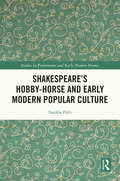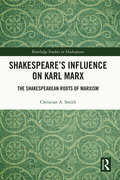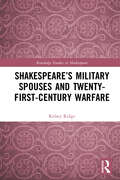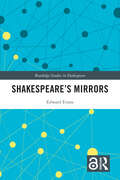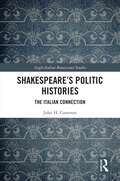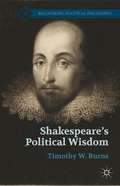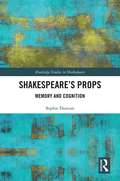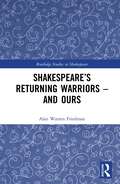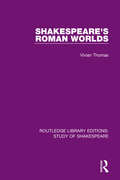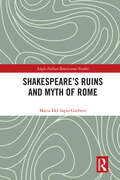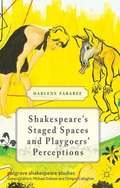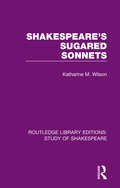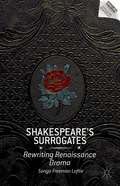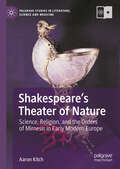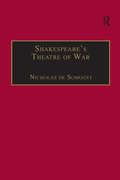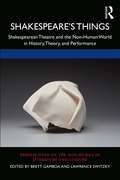- Table View
- List View
Shakespeare’s Global Sonnets: Translation, Appropriation, Performance (Global Shakespeares)
by Jane Kingsley-Smith W. Reginald Rampone Jr.This edited collection brings together scholars from across the world, including France, Italy, Germany, Hungary, Japan, the USA and India, to offer a truly international perspective on the global reception of Shakespeare’s Sonnets from the 18th century to the present. Global Shakespeare has never been so local and familiar as it is today. The translation, appropriation and teaching of Shakespeare’s plays across the world have been the subject of much important recent work in Shakespeare studies, as have the ethics of Shakespeare’s globalization. Within this discussion, however, the Sonnets are often overlooked. This book offers a new global history of the Sonnets, including the first substantial study of their translation and of their performance in theatre, music and film. It will appeal to anyone interested in the reception of the Sonnets, and of Shakespeare across the world.
Shakespeare’s Guide to Hope, Life, and Learning
by Lisa Dickson Shannon Murray Jessica Riddell"What is the most wonderful thing about teaching this play in our classrooms?" Using this question as a starting point, Shakespeare’s Guide to Hope, Life, and Learning presents a conversation between four of Shakespeare’s most popular plays and our modern experience, and between teachers and learners. The book analyzes King Lear, As You Like It, Henry V, and Hamlet, revealing how they help us to appreciate and responsibly interrogate the perspectives of others. Award-winning teachers Lisa Dickson, Shannon Murray, and Jessica Riddell explore a diversity of genres – tragedy, history, and comedy – with distinct perspectives from their own lived experiences. They carry on lively conversations in the margins of each essay, mirroring the kind of open, ongoing, and collaborative thinking that Shakespeare inspires. The book is informed by ideas of social justice and transformation, articulated by such thinkers as Paulo Freire, Parker J. Palmer, Ira Shor, John D. Caputo, and bell hooks. Shakespeare’s Guide to Hope, Life, and Learning advocates for a critical hope that arises from classroom experiences and moves into the world at large.
Shakespeare’s Hobby-Horse and Early Modern Popular Culture (Studies in Performance and Early Modern Drama)
by Natália PikliThis book explores the ways in which the early modern hobby-horse featured in different productions of popular culture between the 1580s and 1630s. Natália Pikli approaches this study with a thorough and interdisciplinary examination of hobby-horse references, with commentary on the polysemous uses of the word, offers an informative background to reconsider well-known texts by Shakespeare and others, and provides an overview on the workings of cultural memory regarding popular culture in early modern England. The book will appeal to those with interest in early modern drama and theatre, dramaturgy, popular culture, cultural memory, and iconography.
Shakespeare’s Influence on Karl Marx: The Shakespearean Roots of Marxism (Routledge Studies in Shakespeare)
by Christian A. SmithThis volume presents a close-reading of instances of Shakespearean quotations, allusions, imagery, and rhetoric found in Karl Marx’s collected works and letters which provides evidence that Shakespeare’s writings exerted a formative influence on Marx and the development of his work. Through a methodology of intertextual and interlingual close-reading, this study provides evidence of the extent to which Shakespeare influenced Marx and to which Marxism has Shakespearean roots. As a child, Marx was home-schooled in Ludwig von Westphalen’s little academy, as it were, which was Shakespeare- and literary-focused. The group included von Westphalen’s daughter, who later became Marx’s wife, Jenny. The influence of Shakespeare in Marx’s writings shows up as early as his school essays and love letters. He modelled his early journalism partly on ideas and rhetoric found in Shakespeare’s plays. Each turn in the development of Marx’s thought – from Romantic to Left Hegelian and then to Communist – is achieved in part through his use of literature, especially Shakespeare. Marx’s mature texts on history, politics and economics – including the famous first volume of Das Kapital – are laden with Shakespearean allusions and quotations. Marx's engagement with Shakespeare resulted in the development of a framework of characters and imagery he used to stand for and anchor the different concepts in his political critique. Marx’s prose style uses a conceit in which politics are depicted as performative. Later, the Marx family – Marx, Jenny and their children - was a central figure in the late-nineteenth-century revival of Shakespeare on the London stage, and in the growth of academic Shakespeare scholarship. Through providing evidence for a formative role of Shakespeare in the development of Marxism, the present study suggests a formative role for literature in the history of ideas.
Shakespeare’s Literary Lives
by Paul FranssenThis is an entertaining account of Shakespeare's afterlives in fiction. Paul Franssen offers the first sustained analysis of stories and films that involve the character of Shakespeare. Taking a broad international and historical perspective, he shows how fictions about Shakespeare help us understand what he meant to a certain age, nation, or author, and how they have become a vital aspect of the Shakespeare industry. Appearing sometimes as a ghost or time-traveller, fictional Shakespeares have been made to speak to many issues, such as the French Revolution, the Irish conflict, colonialism, the Anglo-American relationship, sexual orientation, race and class. Written in an accessible style, this book will appeal to advanced students as well as academic researchers in Shakespeare studies, film and cultural studies, literary reception and creative writing.
Shakespeare’s Medieval Craft: Remnants of the Mysteries on the London Stage
by Kurt A. SchreyerIn Shakespeare's Medieval Craft, Kurt A. Schreyer explores the relationship between Shakespeare’s plays and a tradition of late medieval English biblical drama known as mystery plays. Scholars of English theater have long debated Shakespeare’s connection to the mystery play tradition, but Schreyer provides new perspective on the subject by focusing on the Chester Banns, a sixteenth-century proclamation announcing the annual performance of that city’s cycle of mystery plays. Through close study of the Banns, Schreyer demonstrates the central importance of medieval stage objects—as vital and direct agents and not merely as precursors—to the Shakespearean stage. As Schreyer shows, the Chester Banns serve as a paradigm for how Shakespeare’s theater might have reflected on and incorporated the mystery play tradition, yet distinguished itself from it. For instance, he demonstrates that certain material features of Shakespeare’s stage—including the ass’s head of A Midsummer Night’s Dream, the theatrical space of Purgatory in Hamlet, and the knocking at the gate in the Porter scene of Macbeth—were in fact remnants of the earlier mysteries transformed to meet the exigencies of the commercial London playhouses. Schreyer argues that the ongoing agency of supposedly superseded theatrical objects and practices reveal how the mystery plays shaped dramatic production long after their demise. At the same time, these medieval traditions help to reposition Shakespeare as more than a writer of plays; he was a play-wright, a dramatic artisan who forged new theatrical works by fitting poetry to the material remnants of an older dramatic tradition.
Shakespeare’s Military Spouses and Twenty-First-Century Warfare (Routledge Studies in Shakespeare #1)
by Kelsey RidgeThis volume presents a fresh look at the military spouses in Shakespeare’s Othello, 1 Henry IV, Julius Caesar, Troilus and Cressida, Macbeth, and Coriolanus, vital to understanding the plays themselves. By analysing the characters as military spouses, we can better understand current dynamics in modern American civilian and military culture as modern American military spouses live through the War on Terror. Shakespeare's Military Spouses and Twenty-First-Century Warfare explains what these plays have to say about the role of military families and cultural constructions of masculinity both in the texts themselves and in modern America. Concerns relevant to today’s military families – domestic violence, PTSD, infertility, the treatment of queer servicemembers, war crimes, and the growing civil-military divide – pervade Shakespeare’s works. These parallels to the contemporary lived experience are brought out through reference to memoirs written by modern-day military spouses, sociological studies of the American armed forces, and reports issued by the Department of Defence. Shakespeare’s military spouses create a discourse that recognizes the role of the military in national defence but criticizes risky or damaging behaviours and norms, promoting the idea of a martial identity that permits military defence without the dangers of toxic masculinity. Meeting at the intersection of Shakespeare Studies, trauma studies, and military studies, this focus on military spouses is a unique and unprecedented resource for academics in these fields, as well as for groups interested in Shakespeare and theatre as a way of thinking through and responding to psychiatric issues and traumatic experiences.
Shakespeare’s Mirrors (Routledge Studies in Shakespeare)
by Edward EvansClear mirrors and The Geneva Bible, revolutionary innovations of the Elizabethan age, inspired Shakespeare’s drive towards a new purpose for drama. Shakespeare reversed the conventional mirror metaphor for drama, implying drama cannot reflect the substance of human nature, and developed a method of characterization, through metadrama, self-awareness and soliloquy, to project St. Paul’s idea of conscience onto the Elizabethan stage. This revolutionary method of characterization, aesthetic existence beyond performance, has long been sensed but remains frustratingly uncategorized. Shakespeare’s Mirrors charts the invention of a drama that staged the unstageable: St. Paul’s metaphysical conception of human nature glimpsed through a looking glass darkly.Chapters 4 and 6 of this book is freely available as a downloadable Open Access PDF at http://www.taylorfrancis.com under a Creative Commons Attribution-Non Commercial-No Derivatives (CC BY-NC-ND) 4.0 license.
Shakespeare’s Politic Histories: The Italian Connection (Anglo-Italian Renaissance Studies)
by John H. CameronThis book argues that Shakespeare's first tetralogy is informed by the Italian ‘politic histories’ of the early modern period, those works of history, inspired by the Roman historian Tacitus, that sought to explore the machinations of power politics in governance and in the shaping of historical events; that a close reading of these Italian ‘politic histories’ will greatly aid our understanding of the ‘politic’ qualities dramatized in Shakespeare’s early English History plays; that the writings of Niccolò Machiavelli in particular will likewise aid to such understanding; that these ‘politic histories’ were available (in a variety of forms) to many English early modern writers, Shakespeare included, and are thus helpful as grounds for political and strategic analogy and for informing our reading of Shakespeare's politic histories. While a reading of the Italian ‘politic’ historians can aid in our understanding of Shakespeare’s achievement, we should regard the English History plays as ‘politic histories’ in their own right, i.e. as dramatized versions of precisely the same kinds of ‘politic’ historical writing, with its emphasis on ragion di Stato or raison d’état. This emphasis on what the Elizabethans called ‘stratagems’ suggests new ways to read the plays and to interpret the motivation and action of its characters, ways that challenge some of our more established reading of the plays’ ‘Machiavellian’ characters (particularly Richard III) and suggest far greater strategic acumen on the part of previously overlooked characters (particularly Buckingham and Stanley), providing new ways to read the Shakespeare's politic histories and to better appreciate their Italian connection.
Shakespeare’s Political Wisdom
by Timothy W. BurnsWinner of 2014 CHOICE Outstanding Academic Title Award, Shakespeare's Political Wisdom offers careful interpretations of five Shakespearean plays –Julius Caesar, Macbeth, The Merchant of Venice, King Lear, and The Tempest–with a view to the enduring guidance those plays can provide to human, political life. The plays have been chosen for their relentless attention to the questions that, for Shakespeare, form the heart and soul of politics: Who should rule, and what is justice? Burns provides an original reading of the plays through the lens of political philosophy rather than Theatre or Renaissance Studies. Shakespeare's wisdom found in these five plays, Burns concludes, provides a deeply relevant critique of our contemporary civic culture.
Shakespeare’s Props: Memory and Cognition (Routledge Studies in Shakespeare)
by Sophie DuncanCognitive approaches to drama have enriched our understanding of Early Modern playtexts, acting and spectatorship. This monograph is the first full-length study of Shakespeare’s props and their cognitive impact. Shakespeare’s most iconic props have become transhistorical, transnational metonyms for their plays: a strawberry-spotted handkerchief instantly recalls Othello; a skull Hamlet. One reason for stage properties’ neglect by cognitive theorists may be the longstanding tendency to conceptualise props as detachable body parts: instead, this monograph argues for props as detachable parts of the mind. Through props, Shakespeare’s characters offload, reveal and intervene in each other’s cognition, illuminating and extending their affect. Shakespeare’s props are neither static icons nor substitutes for the body, but volatile, malleable, and dangerously exposed extensions of his characters’ minds. Recognising them as such offers new readings of the plays, from the way memory becomes a weapon in Hamlet’s Elsinore, to the pleasures and perils of Early Modern gift culture in Othello. The monograph illuminates Shakespeare’s exploration of extended cognition, recollection and remembrance at a time when the growth of printing was forcing Renaissance culture to rethink the relationship between memory and the object. Readings in Shakespearean stage history reveal how props both carry audience affect and reveal cultural priorities: some accrue cultural memories, while others decay and are forgotten as detritus of the stage.
Shakespeare’s Returning Warriors – and Ours (Routledge Studies in Shakespeare)
by Alan Warren FriedmanShakespeare’s Returning Warriors – and Ours takes its primary inspiration from the contemporary U.S. Post-Traumatic Stress Disorder (PTSD) crisis in soldiers transitioning from battlefields back into society. It begins by examining how ancient societies sought to ease the return of soldiers in order to minimize PTSD, though the term did not become widely used until the early 1980s. It then considers a dozen or so Shakespearean plays that depict such transitions at the start, focusing on the tragic protagonists and antagonists in paradigmatic "returning warrior" plays, including Titus Andronicus, Julius Caesar, Othello, Macbeth, Antony and Cleopatra, and Coriolanus, and exploring the psychological and emotional ill-fits that prevent warrriors from returning to the status quo ante after battlefield triumphs, or even surviving the psychic demons and moral disequilibrium they unleash on their domestic settings and themselves. It also analyzes the history plays, several comedies, and Hamlet as plays that partly conform to and also significantly deviate from the basic paradigm. The final chapter discusses recent attempts to effect successful transitions, often using Shakespeare’s plays as therapy, and depictions of attempts to wage warfare without inducing PTSD. Through the investigation of the tragedies and model returning warrior experiences, Shakespeare’s Returning Warriors – and Ours highlights a central and understudied feature of Shakespeare’s plays and what they can teach us about PTSD today when it is a widespread phenomenon in American society.
Shakespeare’s Roman Worlds (Routledge Library Editions: Study of Shakespeare)
by Vivian ThomasThe ‘infinite variety’ of Shakespeare’s Roman plays is reflected in the diversity of critical commentary to which they have given rise. Originally published in 1989, the distinguishing feature of this study is that it endeavours to convey a clear idea of the relationship between the characters and events in Shakespeare’s plays and the main narrative sources on which the four Roman plays are based, while simultaneously undertaking a critical analysis of the plays through the perspective of Shakespeare’s Roman worlds, particularly the creation and operation of the value system. Hence these plays are perceived as political plays, histories and tragedies.
Shakespeare’s Ruins and Myth of Rome (Anglo-Italian Renaissance Studies)
by Maria Del Sapio GarberoRome was tantamount to its ruins, a dismembered body, to the eyes of those – Italians and foreigners – who visited the city in the years prior to or encompassing the lengthy span of the Renaissance. Drawing on the double movement of archaeological exploration and creative reconstruction entailed in the humanist endeavour to ‘resurrect’ the past, ‘ruins’ are seen as taking precedence over ‘myth’, in Shakespeare’s Rome. They are assigned the role of a heuristic model, and discovered in all their epistemic relevance in Shakespeare’s dramatic vision of history and his negotiation of modernity. This is the first book of its kind to address Shakespeare’s relationship with Rome’s authoritative myth, archaeologically, by taking as a point of departure a chronological reversal, namely the vision of the ‘eternal’ city as a ruinous scenario and hence the ways in which such a layered, ‘silent’, and aporetic scenario allows for an archaeo-anatomical approach to Shakespeare’s Roman works.
Shakespeare’s Serial Returns in Complex TV (Reproducing Shakespeare)
by Christina WaldThis book examines how Shakespeare’s plays resurface in current complex TV series. Its four case studies bring together The Tempest and the science fiction-Western Westworld, King Lear and the satirical dynastic drama of Succession, Hamlet and the legal thriller Black Earth Rising, as well as Coriolanus and the political thriller Homeland. The comparative readings ask what new insights the twenty-first-century remediations may grant us into Shakespeare’s texts and, vice versa, how Shakespearean returns help us understand topical concerns negotiated in the series, such as artificial intelligence, the safeguarding of democracy, terrorism, and postcolonial justice. This study also proposes that the dramaturgical seriality typical of complex TV allows insights into the seriality Shakespeare employed in structuring his plays. Discussing a broad spectrum of adaptational constellations and establishing key characteristics of the new adaptational aggregate of serial Shakespeare, it seeks to initiate a dialogue between Shakespeare studies, adaptation studies, and TV studies.
Shakespeare’s Shrews: Italian Traditions of Paradoxes and the Woman’s Debate (Anglo-Italian Renaissance Studies)
by Beatrice RighettiShakespeare’s Shrews: Italian Traditions of Paradoxes and the Woman’s Debate investigates the echoes of two early modern discourses—paradoxical writing and the woman’s question or querelle des femmes—in the representation of the “Shakespearean shrew” in The Taming of the Shrew, Much Ado About Nothing, and Othello.This comparative cross‑cultural study explores the English reception of these traditions through the circulation, translation, and adaptation of Italian works such as Ludovico Ariosto’s Orlando Furioso, Baldassare Castiglione’s Il libro del cortegiano, and Ercole and Torquato Tasso’s Dell’ammogliarsi. The enticing interplay of these two discourses is further complicated by their presence in the writing of early modern male and female authors. The examination of Shakespeare’s adaptation of these traditions in his “shrew” character highlights two key findings: the thematic fragmentation of the woman’s question and the evolving role of paradoxes, from figures of speech to “figures of thought”, both influenced by the gender of the speaker.
Shakespeare’s Speculative Art
by Maurice A. HuntThis is the first book-length analysis of Shakespeare s depiction of specula (mirrors) to reveal the literal and allegorical functions of mirrors in the playwright s art and thought. Adding a new dimension to the plays Troilus and Cressida, Julius Caesar, Macbeth, Hamlet, King Henry the Fifth, Love s Labor s Lost, A Midsummer Night s Dream, and All s Well That Ends Well, Maurice A. Hunt also references mirrors in a wide range of external sources, from the Bible to demonic practices. Looking at the concept of speculation through its multiple meanings - cognitive, philosophical, hypothetical, and provisional - this original reading suggests Shakespeare as a craftsman so prescient and careful in his art that he was able to criticize the queen and a former patron with such impunity that he could still live as a gentleman.
Shakespeare’s Staged Spaces and Playgoers’ Perceptions
by Darlene FarabeeThis engaging study offers fresh readings of canonical Shakespeare plays, illuminating ways stagecraft and language of movement create meaning for playgoers. The discussions engage materials from the period, present revelatory readings of Shakespeare's language, and demonstrate how these continually popular texts engage all of us in making meaning.
Shakespeare’s Sugared Sonnets (Routledge Library Editions: Study of Shakespeare)
by Katharine M. WilsonIn the course of some research into the musical element in English poetry, Dr Wilson read the work of the Elizabethan sonneteers chronologically and was struck by a suspicion that Shakespeare’s sonnets were parodies. Later she carried out a more thorough investigation, and this book, originally published in 1974, is the product: her early impressions had been justified beyond all expectation. Her investigation involved examining the background of each of Shakespeare’s sonnets, and this in itself is a contribution to scholarship. A surprising number of them are shown to be direct parodies of particular sonnets; all of them guy the sonnet convention, and the more difficult ones are easily explained by this hypothesis. Fresh correspondences between Shakespeare and his predecessors have come to light and his relationship with them is seen to be mocking. This is demonstrated in his borrowings from Ovid also, while the opening seventeen sonnets gain point as parody of Erasmus on marriage. The book opens with a short note on the origin of the sonnet in song, chivalric love and Plato. The sonnet theme in Shakespeare’s early comedies is treated freshly and the author throws light on the plays from a new angle. In the final chapter, among other themes, the implication of dating is considered, and here too some new material is discussed. However, Dr Wilson is aiming at a wider readership than that of scholars alone. She has a view of Shakespeare as a young man catering for "young-man laughter", as she puts it, and she never loses sight of this aspect in her study. Although the academic basis is there, the presentation is not academic. Her aim is clearly to share the joke with her readers.
Shakespeare’s Suicides: Dead Bodies That Matter (Routledge Studies in Shakespeare)
by Marlena TronickeShakespeare’s Suicides: Dead Bodies That Matter is the first study in Shakespeare criticism to examine the entirety of Shakespeare’s dramatic suicides. It addresses all plays featuring suicides and near-suicides in chronological order from Titus Andronicus to Antony and Cleopatra, thus establishing that suicide becomes increasingly pronounced as a vital means of dramatic characterisation. In particular, the book approaches suicide as a gendered phenomenon. By taking into account parameters such as onstage versus offstage deaths, suicide speeches or the explicit denial of final words, as well as settings and weapons, the study scrutinises the ways in which Shakespeare appropriates the convention of suicide and subverts traditional notions of masculine versus feminine deaths. It shows to what extent a gendered approach towards suicide opens up a more nuanced understanding of the correlation between gender and Shakespeare’s genres and how, eventually, through their dramatisation of suicide the tragedies query normative gender discourse.
Shakespeare’s Surrogates
by Sonya Freeman LoftisShakespeare's Surrogates contends that the adaptation of Renaissance drama played a key role in the development of modern drama's major aesthetic movements. This book reveals the way that modern drama built itself in response to its Elizabethan past, ransacking the literary work of Shakespeare and his contemporaries for 'new' innovations in dramatic technique and content. Indeed, playwrights central to the evolution of modern and postmodern drama often returned at key moments in their writing careers to the remains of the Renaissance. Sonya Freeman Loftis argues that for playwrights such as Bernard Shaw, Bertolt Brecht, Eugene O'Neill, Samuel Beckett, Tom Stoppard, and Heiner Muller, Shakespearean appropriation was central both to the creation of their public personas and to the development of their own dramatic canons. "
Shakespeare’s Theater of Nature: Science, Religion, and the Orders of Mimesis in Early Modern Europe (Palgrave Studies in Literature, Science and Medicine)
by Aaron KitchShakespeare’s Theater of Nature argues that Shakespeare combined art and nature in new ways while experimenting with relations between words, images, and objects as sources of knowledge and pleasure. Shakespeare’s re-centering of nature as a source of theatrical representation in a range of plays follows debates in natural philosophy and theology about how to understand divinity in and through the order of nature (ordo creationis). Early chapters analyze early modern reframing of nature by printed books of botany, cosmology, and history—as well Tudor interludes that center nature as a subject—while later chapters offer readings of eight plays by Shakespeare that draw on classical, medieval, and early modern debates in natural philosophy and theology to create new modes of dramatic mimesis.
Shakespeare’s Theatre of War
by Nicholas de SomogyiThe period between 1585 (when Elizabeth formally committed her military support to the Dutch wars against Spain) and 1604 (when James at last brought it to an end) was one in which English life was preoccupied by the menace and actuality of war. The same period spans English drama’s coming of age, from Tamburlaine to Hamlet. In this thought-provoking book, Nick de Somogyi draws on a wide range of contemporary military literature (news-letters and war-treatises, maps and manuals), to demonstrate how deeply wartime experience influenced the production and reception of Elizabethan theatre. In a series of vivid parallels, the roles of soldier and actor, the setting of battlefield and stage, and the context of playhouse and muster are shown to have been rooted in the common experience of war. The local armoury served as a props department; the stage as a military lecture-hall. News from the front line has always been shrouded in the fog of war. Shakespeare’s Rumour is here seen as kindred to such equally dubious messengers as his Armado, Falstaff or Pistol; soldiers have always told tall tales, military ghost-stories that are here shown to have seeped into such narratives as The Spanish Tragedy and Henry V. This book concludes with a sustained account of Hamlet, a play which both dramatises the Elizabethan context of war-fever, and embodies in its three variant texts the war and peace that shaped its production. By affording scrutiny to each of its title’s components, Shakespeare’s Theatre of War provides a compelling argument for reassessing the drama of Shakespeare and his contemporaries within the enduring context of the military culture and wartime experience of his age.
Shakespeare’s Things: Shakespearean Theatre and the Non-Human World in History, Theory, and Performance (Perspectives on the Non-Human in Literature and Culture)
by Brett Gamboa Lawrence SwitzkyFloating daggers, enchanted handkerchiefs, supernatural storms, and moving statues have tantalized Shakespeare’s readers and audiences for centuries. The essays in Shakespeare’s Things: Shakespearean Theatre and the Non-Human World in History, Theory, and Performance renew attention to non-human influence and agency in the plays, exploring how Shakespeare anticipates new materialist thought, thing theory, and object studies while presenting accounts of intention, action, and expression that we have not yet noticed or named. By focusing on the things that populate the plays—from commodities to props, corpses to relics—they find that canonical Shakespeare, inventor of the human, gives way to a lesser-known figure, a chronicler of the ceaseless collaboration among persons, language, the stage, the object world, audiences, the weather, the earth, and the heavens.
Shakespeare’s Tragic Art
by Rhodri LewisA new account of Shakespearean tragedy as a response to life in an uncertain worldIn Shakespeare&’s Tragic Art, Rhodri Lewis offers a powerfully original reassessment of tragedy as Shakespeare wrote it—of what drew him toward tragic drama, what makes his tragedies distinctive, and why they matter.After reconstructing tragic theory and practice as Shakespeare and his contemporaries knew them, Lewis considers in detail each of Shakespeare&’s tragedies from Titus Andronicus to Coriolanus. He argues that these plays are a series of experiments whose greatness lies in their author&’s nerve-straining determination to represent the experience of living in a world that eludes rational analysis. They explore not just our inability to know ourselves as we would like to, but the compensatory and generally unacknowledged fictions to which we bind ourselves in our hunger for meaning—from the political, philosophical, social, and religious to the racial, sexual, personal, and familial. Lewis&’s Shakespeare not only creates tragedies that exceed those written before them. Through his art, he also affirms and invigorates the kinds of knowing that are available to intelligent animals like us.A major reevaluation of Shakespeare&’s tragedies, Shakespeare&’s Tragic Art is essential reading for anyone interested in Shakespeare, tragedy, or the capacity of literature to help us navigate the perplexities of the human condition.


